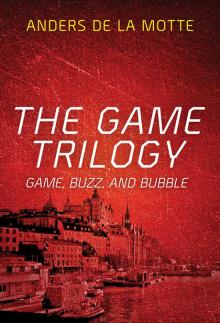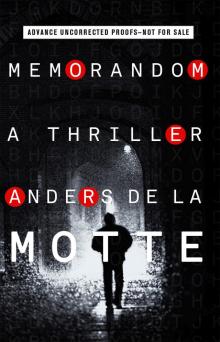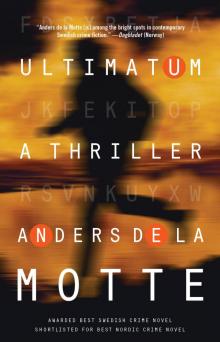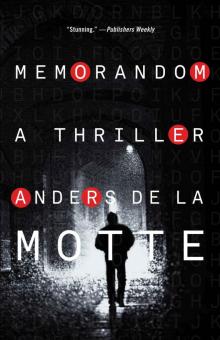- Home
- Anders de la Motte
End of Summer Page 8
End of Summer Read online
Page 8
*
Månsson devoured three toasted sandwiches in rapid succession, and had taken a first bite of a fourth when his indigestion caught up with him. He discreetly stifled a burp with his hand. The acid reflux burned in his throat and he put his knife and fork down and leaned back.
‘The Nilsson children,’ he said. ‘You’ve seen them at school, I suppose?’
‘Yes.’ Malin stood up and cleared his plate and cutlery away. ‘Mattias Nilsson finished Year 9 this spring. A nice boy, well behaved, doesn’t exactly draw attention to himself.’
‘Is he going on to sixth form in the city?’
‘Yes. The two-year social studies course, I seem to recall. I think he was hoping to join the police, or maybe the fire brigade.’
‘And the girl? Vera?’
Malin sat down beside him again and shook her head gently. ‘As a careers advisor you don’t really see the students until they reach Year 8. Obviously I know who she is, I see her in the corridors. Hear what her teachers say about her.’
‘And what do they say?’
‘That she’s smart, she gets good grades.’ Malin sounded a little circumspect all of a sudden.
‘But?’ He knew her as well as she knew him. He knew when it was time to ask a follow-up question.
Malin shrugged her shoulders. ‘That she can be a bit difficult at times.’
‘In what way?’ He could see the girl in front of him. Those coltish legs, the voice that was still a child’s.
Malin looked off towards the hall, as if she was worried one of the boys was standing there listening. She leaned closer to him.
‘She’s evidently something of an early developer. Boys, alcohol. The counsellor’s been involved, but I don’t know any more than that.’
Månsson nodded. He was thinking about the expression in Vera Nilsson’s eyes. Intelligence, alertness, and something else. Something unsettling.
Darling,
Do you remember the first time we met? Even then I knew you were the one for me. I knew it the moment our eyes met. Maybe that sounds silly, like some teenage infatuation. But it’s how I feel. You mean everything to me. Everything!
I dreamed about you last night. That you were here, beside me, in my arms. Forever. Instead I have to make do with brief moments of happiness. Right now I can live with that. I’ll wait patiently for you because I know that our time will soon be here.
Chapter 15
F
or the first time in a long while she dreams about her mum. The same dream, and when she wakes up on Saturday morning her head feels sluggish and her body heavy.
She goes for a quick walk to get herself going, and checks for evidence of the fox she saw the previous evening. She can’t find anything. Because foxes are cunning. They know how to move without leaving any sign.
When they were little Uncle Harald used to tell stories to her and Mattias. Always in secret, when Mum couldn’t hear. The stories were terrifying, about children getting into trouble. Children drowning, starving or freezing to death. Sometimes the stories made her wake up in terror in the middle of the night, her nightdress wet with sweat. Even so, she and Mattias never told their mother the reason for their nightmares. They knew Uncle Harald never forgave anyone who couldn’t keep a secret.
She follows the pavement to where she saw the smoker standing the other night. The smoker wasn’t as cunning as the fox, because she finds cigarette butts in the gutter. Five of them, all with a red crown printed on the paper just above the filter. Red Prince, the sort her mum smoked.
She thinks about the packet of cigarettes in Isak’s carefully rolled up James Dean sleeve. Imagines that it was white and red, then the strong smell of tobacco on his breath, which oddly makes her feel a bit excited. She tosses the cigarette butts on the ground and hurries back home.
The eye of the phone is winking at her invitingly when she gets in, and she finds herself hoping it’s Leon. But when she taps in the code she hears Mattias’s voice.
‘I’ve found Isak. Call me.’
Her excitement grows as she calls him back.
‘Hi, Vera, hold on.’
She hears voices in the background, then footsteps and a door closing.
‘That’s better. Right, I’ve tracked down the Sjölin family. Like I said, they’ve moved away. Their dad lost his job when the brickyard closed down, and they ended up in Kristianstad . . .’
Her curiosity gets the better of her and she interrupts him.
‘What about Isak?’
‘Studying architecture in Oslo for the past two years. I’ve got his number, but I haven’t got hold of him yet. According to the mother, they don’t often talk about Billy, but she remembers them discussing a newspaper article about his disappearance when Isak was home last spring. It evidently upset him.’
‘So it could be him?’ Her pulse begins to quicken again.
‘It’s not impossible. Just to be on the safe side I asked his mother to fax me a picture of him. I’ve got it in front of me now.’
‘What does he look like, is he blond?’
‘The fax is black and white and the picture isn’t great quality, so it’s hard to tell. But he certainly looks like he’s got fair hair.’
Frustration makes her bite her bottom lip. Then she has an idea.
‘Listen, we’ve got a fax at work. I’ll head over now, and call you when I get there.’
*
The metro gods are more helpful than usual and in little more than thirty-five minutes she’s switching off the alarm in the Civic Centre. The big meeting room looks even sadder when it’s empty.
Ruud’s office is at the far end of the room. Although you couldn’t really call the windowless little room he hangs out in an office. Cubbyhole would be closer to the truth. The lino floor can’t be more than five square metres in area, and the noticeboards covering all the walls are plastered with lists, pictures and folders relating to different seminars, meetings and groups.
It feels a bit unnerving, walking into Ruud’s private sanctuary without asking for permission. The room even smells of him. Chewing tobacco, coffee, and something else she can’t quite describe.
The desk is dominated by the keyboard and a huge computer monitor which is almost completely covered with Post-It notes. The fax machine is perched on a small filing cabinet, and she calls Mattias from Ruud’s phone and gives him the number on the Dymo label stuck next to the on button. Then, while she waits impatiently, she looks at the sheets of paper on the noticeboards. Instead of getting rid of anything out of date, it looks like Ruud just pins new information on top of older material, making his noticeboards into a sort of retrospective collage of the history of the Civic Centre. She stops short when she sees her own picture on a folder from the northern district. Veronica Lindh, conversational therapist. The photograph is several years old, taken when she first started the job. The thought that this photograph of her exists in hundreds, possibly thousands of folders, is oddly unsettling. Unless it’s the memories of Leon and her old workplace haunting her.
A sudden noise makes her start. The fax machine has woken up and is slowly spitting out a sheet of paper. She goes and stands in front of it, waiting. Almost holding her breath.
Mattias was right. The photograph is blurred, and doubtless hasn’t been improved by being faxed a second time. But one thing at least is abundantly clear, and doesn’t change no matter how much she stares at the warm paper.
She breathes out and sits down heavily on Ruud’s desk chair, then picks up the phone. Mattias answers on the first ring. He doesn’t even bother to say hello.
‘Well?’
She looks at the picture one last time. Isak Sjölin looks perfectly ordinary. A side parting, slightly protruding ears and a kind, almost shy look in his eyes. There isn’t the slightest similarity between him and the blond man in her therapy group.
‘It isn’t him.’
‘You’re sure?’
‘No doubt at all.’
&
nbsp; ‘OK.’ Several seconds pass, as Mattias seems to ponder what to say next. ‘How many times has this man come to your sessions?’
‘Two, most recently yesterday.’
‘Has he spoken directly to you? Asked any questions?’
‘No.’ She shakes her head, which is obviously ridiculous seeing as Mattias can’t see her. ‘He leaves as soon as the sessions are over.’
She wonders about mentioning the motorbike and cigarette butts on her street. Once upon a time she used to tell Mattias all her secrets. But that’s a long time ago now. Before he stayed and she left.
‘When’s the next session?’
‘Monday.’
‘Can you ask to switch groups?’ He’s looking at the problem in practical terms, just as she expected. Get out of the way, hide for a while and it might all sort itself out.
‘No.’ She comes close to shaking her head again.
‘Why not?’
‘I just can’t.’ She has no inclination to tell him that she has no room for manoeuvre right now. He would immediately ask why, and she doesn’t feel like telling him about her breakdown. About Leon, the therapy, and the fact that she’s under Ruud’s supervision. So instead she changes the subject abruptly.
‘I dreamed about Mum last night. The hawk’s eggs up on the silo.’
He says nothing, but she can tell that he’s uncomfortable. She almost imagines she can hear his chair creak anxiously.
‘Look, Vera . . .’ He sounds far less decisive now. Unsure enough to let himself be interrupted.
‘Why do you think she did it?’
‘Because what we did was wrong. Because you don’t break birds’ eggs.’
‘Not that. The lake, the ice. Why do you think she committed suicide? I mean, her doctors said she was getting better.’
‘How the hell should I know? Mum lost interest in me long before the little prince . . .’
He regrets saying that immediately, she can tell. But it’s too late now, the words are already out. Lingering on the phone line.
‘What I meant is that we weren’t exactly close. I was only sixteen, I had no idea what was going on inside her head.’ He clears his throat. ‘Anyway, you’re the therapist in this family. Why does anyone commit suicide?’
‘Because they don’t have anything to live for.’ Her answer comes instinctively, before she has time to think about it.
Silence again. The line crackles, as if he’s sitting up. She hears him take a breath, it sounds like he’s about to say something.
Then there’s a distant knock, followed by the sound of a door opening. A woman’s voice says something she can’t quite hear.
‘OK,’ Mattias says. ‘Get the car and I’ll see you round the front.’
Then he’s back on the line.
‘Listen, something’s come up, I’m going to have to go. Call me if this guy shows up again on Monday, and don’t say a word to him about Billy. OK?’
This last bit sounds like a police officer giving orders, not a brother talking to his sister. Before she has time to tell him that, he’s hung up.
*
She sits quietly at Ruud’s desk for a few moments. The blond guy isn’t Isak Sjölin, which in some ways is a bit of a blow. Deep down she’d been hoping that he was. Hoping to hear what he remembered about Billy. And maybe Mum too.
But that isn’t going to happen now. Because the blond guy isn’t an old acquaintance, he’s a stranger. Someone whose motives and intentions are unclear.
A thought suddenly hits her. Mattias had said that Isak Sjölin and his mother had discussed an article about Billy back in the spring. She turns Ruud’s computer on and waits impatiently for the search engine to appear.
It takes her a while to find the article, and she scrolls quickly down to the by-line without reading the text. The author of the article turns out to be a woman, not the young, over-eager blond man she was expecting. She scrolls back up to the headline again. It’s unusually fitting. Summarises the whole tragedy in just five words.
The summer that never ended.
Immediately beneath the title were three pictures. One is the photograph of Billy that she’s got in her box at home. The police must have used it in the investigation seeing as the newspaper had got hold of a copy. The second photograph is of Tommy Rooth, probably from his driving licence. It shows a fair-haired man with intense eyes and an arrogant smile. She has to admit that he looks handsome, in that bad-boy way that some women like. The way she used to like them.
The third picture is computer-generated, a man who looks human but is still missing something that would make him look properly real.
She stares at the picture, then at the caption beneath it. The room lurches, then it does it again, and she grabs the desk to stop herself falling.
What Billy Nilsson would look like today.
The blond man on the screen stares at her with lifeless eyes.
Chapter 16
Summer 1983
M
ånsson was shuffling the papers covering his desk. Sorting them into piles, mostly to convince himself that he was actually doing something useful.
On the far left was a large bundle of memos about work that had been carried out, including the searches with police dogs and the helicopter he had requisitioned from Malmö. Next to the memos was the large heap of reports from the search parties. On top was the well-thumbed map where he had marked the areas that had been searched. A third pile contained all the interviews that had been conducted – the boy’s father, older siblings, neighbours. And anyone else who might have something of value to contribute, which wasn’t many people.
Then finally, on the far right, the pile of tip-offs from the public. Ninety-five per cent of them from people who had never set foot in the area or seen Billy Nilsson except in photographs. An unholy mix of crazies, armchair detectives, self-proclaimed experts and loners who just wanted someone to listen to them for a while.
The rest of the tip-offs weren’t much to write home about either. A few reports of unfamiliar vehicles or people behaving oddly, and then a list of suggestions from locals as to who they should be investigating and why. As if he didn’t already know. Tommy Rooth’s name appeared in practically ever other sentence, and Månsson was well aware why. Rooth was a regularly recurring name in the police station, and by now Månsson knew the whole of the man’s life story. Restless and a bit of a troublemaker at school, souped-up mopeds, criminal damage, all the usual. Then, later on, unlawful driving, drunk and disorderly conduct, fights in public places and clubs. Usually clashes with jealous boyfriends of the girls he was hitting on, unless they were the ones hitting on him. Rooth was undeniably good-looking. A chiselled, tanned face, fair hair that kept falling across one eye. And there was something about the look in those eyes. Self-assured, almost arrogant, just like his behaviour. Out here in the countryside, where the men were mostly taciturn and withdrawn when they were sober, it wasn’t hard to understand why women were attracted to him.
Rooth went off to sea as soon as he came of age. He returned in 1974, after his father died, together with a woman he had hooked up with in Malmö. They moved into the family farm and started their own family. In spring and summer he did seasonal work, laying tarmac and helping with the pea harvest. In autumn and winter he supported himself as best he could with whatever odd jobs he could get, and with what he could make from his own smallholding. Rooth didn’t follow the unspoken rules of the area, he refused to accept his place in the hierarchy, and that sort of thing wound people up, and they started to talk. About the theft of diesel and poaching, about Rooth’s mother being a gypsy, and that he had been thrown out by his father. That he had even killed a man when he was at sea.
Månsson dug out the short interview that had been conducted with Rooth. His scornful tone was clearly discernible in the dry typed transcript.
I’m only here because of what happened with Aronsson’s car last autumn. Your boss does what he’s told, just like
everyone else in this godforsaken place. Anyway, why isn’t Månsson here in person, doesn’t he have the guts to talk to me? I thought we knew each other pretty well by now.
The penultimate sentence made Månsson flush slightly with embarrassment, both at what Rooth had said, and the fact that it had been kept in the transcript. But perhaps most of all because there was a grain of truth in the allegation. Rooth had no respect for authority, and that included the forces of law and order. Månsson found people like that difficult. He didn’t like conflict, especially not conflicts he didn’t think he could win, which was why he had chosen not to be present when Rooth was questioned.
He leafed through the main file containing all the material relating to the case, going through it yet again, comparing it to every document in the other piles. And, just like the twenty-five times he had done this before, the result was the same.
He had followed the procedure to the letter. Had searched every possible location, expanded the search area so it stretched considerably further than a five-year-old boy with only one shoe might have been able to walk in rain and darkness. He had interviewed anyone who could possibly have any involvement, even following up tip-offs from people claiming to be in touch with ‘the other side’. Despite all that, he had failed. Billy Nilsson was still missing, and he wasn’t the slightest bit closer to solving the mystery than he had been when he stood under the canopy on the terrace at Backagården and promised Ebbe Nilsson that he would find his little boy.
Månsson took a swig from the mug on the desk and regretted it immediately. Lukewarm coffee was hardly what he needed right now. His unsettled stomach had been telling him it was high time for lunch for a while. That was usually a part of the day he looked forward to. The local pub served sturdy portions of traditional Swedish food, but today he didn’t feel any inclination to go.
He stood up and opened the door to the corridor and conference room. The two detectives the regional police chief had sent over were sitting in there eating takeaway pizza. The smell made him put his hand on his stomach. Bloody gastric catarrh, one minute he was feeling sick, the next hungry enough to eat a horse.

 Rites of Spring
Rites of Spring Game: A Thriller
Game: A Thriller End of Summer
End of Summer Buzz: A Thriller
Buzz: A Thriller The Game Trilogy
The Game Trilogy Bubble: A Thriller
Bubble: A Thriller MemoRandom
MemoRandom Ultimatum
Ultimatum MemoRandom: A Thriller
MemoRandom: A Thriller